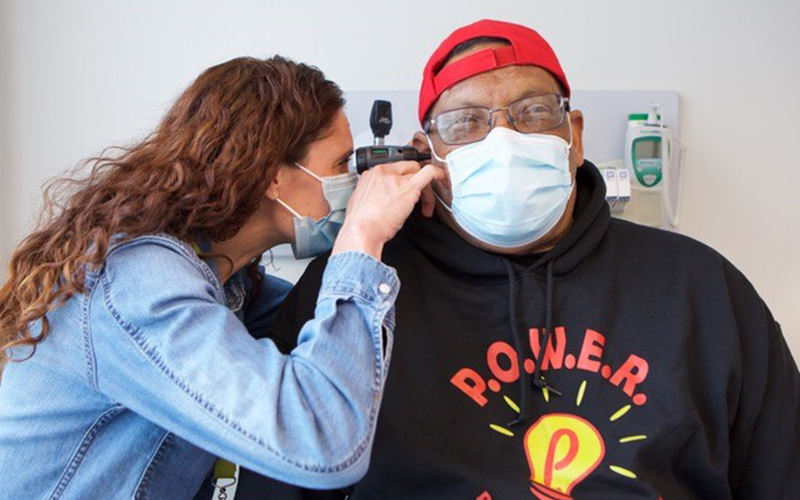
Mapping clinical care to disease progression, while making advance directives, care proxies, and involving authorized loved ones is a rare privilege that many do not get to witness. Our Integrated Primary Care team honours this privilege by promoting compassionate, collaborative and respectful primary palliative care as a way of delivering whole-person care.
Palliative care is a specialized service for people living with a serious, life-limiting or life-threatening illness which focuses on providing relief from the symptoms and stress of the illness. To better serve our clients, members of our clinical team have received focused training in palliative care. We have adapted this practice as an integral component of our clinical services and are moving towards it becoming a standard clinical practice. Our Clinic Nurses have taken on greater responsibility around facilitating advance care planning and providing compassionate palliative care to patients and their families. These have included planning and delivering targeted training sessions for family members on correctly completing essential tasks, such as wound care, changing bedsheets, as well as what to do when patient dies. Family capacities, competencies, culture and beliefs/faith are taken into consideration when planning and providing such supports. These factors are also considered by our clinicians when deciding on appropriate interventions. Our clinicians are committed to honest, open and two-way communication to combine patient-family values, preferences and scientific evidence in medical screening, treatment and discussions.
As Canada’s and Toronto’s populations age, the number of people living with serious illnesses and preferring to live in homes is rapidly increasing, and so is demand for primary palliative care. This underscores the importance of our goal to increase equitable access to participatory, low-cost holistic care, and to continue providing care to patients who are medically uninsured. As we strive to integrate palliative care to primary care, we aim to facilitate well-coordinated, collaborative and continuous care across care settings. Our goal is to improve quality of life throughout the patient journey by promoting advance care planning earlier in the disease trajectory and creating a trusted setting where patients can receive the most of their care.
Our team works towards achieving these goals by prioritizing open communication between our care team, patients and their families. Our clinicians dismantle the hierarchical perception of medical staff as superior and instead operate respectfully in ways that make patients and families feel acknowledged and valued. This is achieved by applying empathy, compassion and non-judgement to all conversations and interventions, and using plain language and interpretation services when needed to remove communication barriers. We understand that communication is optimized when trust and safety are established between patients, their families and our staff. Our care team builds trust by being thoughtful and caring in conversations about serious illness and advanced care planning. Regularly scheduled meetings are used to understand patient health needs, as well as facilitate a safe space for families to voice their uncertainties or fears, discuss death and dying, and what to do if this happens at home. Our team respects client choice of who to include during these conversations and ensures that the client always remains the shared priority.


Accessible, low-barrier care for pregnant people
The MATCH (Midwifery and Toronto Community Health) Program was first funded by the Ministry of Health in 2018. Four midwives were embedded into South Riverdale CHC’s primary care team with a goal of delivering midwifery services to patients who otherwise often face barriers to accessing high quality sexual and reproductive health care.
In addition to pregnancy, labour, birth, and postpartum care, the MATCH team identified low-barrier abortion care and accessible miscarriage management care as service gaps for clients served. While abortion care and miscarriage management are included in the scope of practice for midwifery, as a part of “normal pregnancy care,” there had never been a funding mechanism in Ontario’s Midwifery Program (prior to the salaried staff midwives at South Riverdale) to allow midwives to offer this care. There are also ongoing regulatory barriers related to midwifery pharmacopeia. Our MD and NP colleagues enthusiastically partnered with us to provide this care, first in a team-based model, where all clients saw a midwife and an MD or NP. After three years of building this team-based practice, we now have a medical directive that allows midwives to dispense medications directly to clients who meet the criteria for medication abortion. For later gestations (9-11 weeks of pregnancy) and for miscarriage management, we continue to provide care in a team-based model, and all clients have access to contraceptive care with our MD or NP colleagues.
Abortion and miscarriage management represents care that is costly and difficult to access for uninsured clients. Our team provides extremely low-barrier access to this care. Working within a salaried model allows our midwifery team to take on clients for one-off visits or for the entire childbearing year. Clients are able to access free, sexual and reproductive healthcare with a dedicated team, and have access to ultrasound and diagnostic testing for free under midwifery care. Midwives provide comprehensive, client-centred care with counselling about issues like anemia, diagnosis and treatment of sexually transmitted infections, and 24/7 on-call access to a midwife. This model is unique in the system. Because of our existing to partnerships with other CHC’s to provide this care in the community, our team developed expertise and skill in this area, and as of 2022, we were funded to expand our program, adding a fifth midwife. With that additional funding, we have also assumed responsibility for Michael Garron Hospital’s Early Pregnancy Outpatient Clinic. Our community and hospital partnership improves care for clients and moves us closer to a “system without discharges.”
